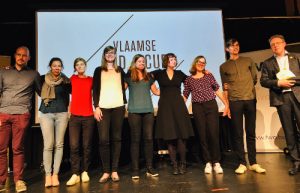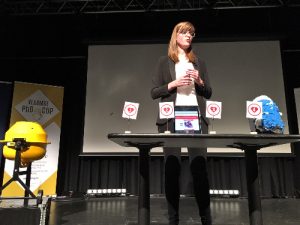Winning the PhD Cup? 5 insider tips
Many PhD graduates dream of winning the Flemish PhD Cup. But no pain, no gain! They will need to explain their research in under three minutes and persuade the jury, first during the semi-finals and later during the final round. On October 6, eight finalists will be battling it out for that one coveted trophy. But how can you win it? Here are five insider tips.
At The Floor is Yours, we have been preparing sixteen selected PhD graduates during one of our presentation workshops. Those workshops are part of an intensive media training, during which experts like Tim Pauwels from VRT (the national public-service broadcaster for the Flemish Community of Belgium) will be teaching attendees the tricks of the trade.
The first test following this media training are the semi-finals. Those already took place on September 25. This is where the jury decided which eight participants would be advancing to the final round. The jury consisted of my colleague Toon Verlinden and myself, joined by several journalists and other scientists.
Those jury discussions are usually kept confidential, but just this once I think we can overlook that rule. After all, what is discussed around that VRT table could prove to be quite useful for your next presentation, during a final round or on any other stage where you will be stealing the show.
Here are the top five tips from the jury:
1. Enter with a bang!
Those first few moments of your presentation are vital. Use them to surprise, amaze, or move your audience.
But it isn’t just about drawing their attention. That opener should segue nicely into your main message. After those first couple of sentences, your audience wants to think: ‘Oh, I see!’
Now use the time that is left to explain step-by-step how it all works or what exactly you researched.
2. Make sure they understand
A jury member once said: ‘Make sure you can explain it to that one idiot who is also interested.’ The idiot he was referring to, was himself. Even though you may be speaking to an educated audience, it is never easy to explain things in a way that everyone will understand completely.
Your story must come together. It should make sense.
Don’t be afraid to expressly demonstrate this structure. When saying ‘The problem is…’, why not follow with ‘But the solution I found for this is…’. Or use key words such as ‘but’ to mark a problem.
3. So what?
Once we understand the issue, our next question will be: ‘Now what?’ How can you link your research to a concrete application? That is what your audience will be looking for.
As jury members we often enquired about the consequences of a person’s research, because exactly that information was often missing. Let’s take cannabis allergy as an example. Can that in fact be caused by wearing hemp clothing, or eating hemp granola?
Those concrete cases will ensure that your research immediately hits home with your audience. Make sure to include that relevance in your presentation.
4. Tell us the story
What your audience wants, is to be glued to a speaker’s lips.
We aren’t looking for a performer on stage, but a storyteller. No memorized sales pitch, but a speech straight from the heart. No abstract academic jargon, such as ‘their well-being is in decline’, but rather real and vivid phrases.
So, no more practice and simply let the words pour out? Perhaps the exact opposite would be a better idea: give it an extra run-through to really know your content inside and out. After all, coming across naturally also takes practice.
5. Slides? Perhaps not.
Better too many than not enough? Not for slides. Slides can seriously overcomplicate and distract from your message.
Your audience should be listening to and following the speaker on stage. An image here or there, or some clarifying words are alright, but keep it simple. Less is more!
Avoid graphics where the audience needs a full minute to figure out what is being presented. Don’t be afraid to leave things out. Perhaps you don’t need any slides at all?
Could you present your story using props? Try it out. A prop will stick in people’s minds much longer than a slide.
Is it really about winning?
Although more than one speaker may deserve it, there can only be one winner. If there was one thing the semi-final jury members agreed on, it was that we were sure happy not to be judging the final round. The final jury members will have a tough task selecting a winner from the eight finalists.
But what is it really about? Giving speakers the opportunity to inspire people around them. Having your story move others to view or interpret things in a different way. That is what it’s all about! If you can get that far, you are already a winner.
You can learn it too!
Want to attend the presentation workshop that we offer to the 16 semi-finalists of the Flemish PhD Cup? Our workshop ‘Present with Impact’ gets you right started.
__
Photo homepage ‘winner’ by bruce mars on Unsplash


